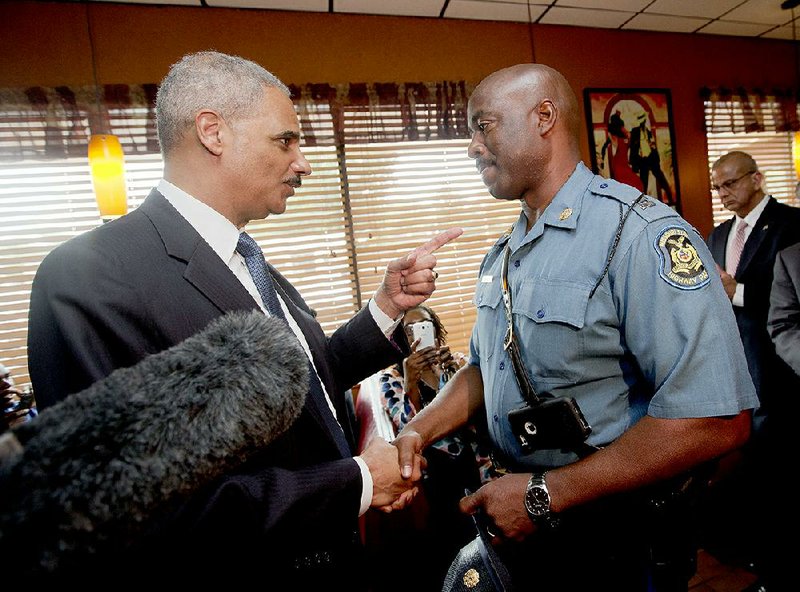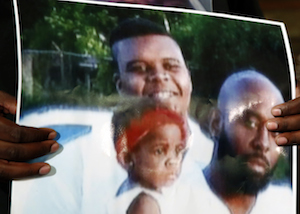CLAYTON, Mo. -- U.S. Attorney General Eric Holder visited Ferguson on Wednesday and met with students, community leaders and federal investigators as the St. Louis County prosecutor opened grand jury hearings in the fatal police shooting of unarmed, 18-year-old Michael Brown.
Holder's arrival coincided with one of the most peaceful days since the Aug. 9 shooting of the black teenager touched off racial unrest and rioting in the Missouri town. While walking through Drake's Place Restaurant in Ferguson, Holder told diners concerned about the recent violent protests that "we can make it better."
Wednesday evening, Holder met with Brown's parents. Earlier he made his first stop of the day at a campus of St. Louis Community College in nearby Florissant.
Holder told a group of young people at the college that as a black man he understands why many blacks mistrust the police. He told the group about discriminatory police actions he encountered years ago.
"I am the attorney general of the United States. But I am also a black man. I can remember being stopped on the New Jersey Turnpike on two occasions and accused of speeding. Pulled over ... 'Let me search your car.' ... Go through the trunk of my car, look under the seats and all this kind of stuff," he said. "I remember how humiliating that was and how angry I was and the impact it had on me."
He also recalled an incident in which he was stopped by Georgetown police during a nighttime jog with his cousin.
"Police car comes driving up, flashes his lights, yells, 'Where you going? Hold it!' I say, 'Whoa, I'm going to a movie.' Now my cousin started mouthing off. I'm like, 'This is not where we want to go. Keep quiet.' I'm angry and upset. We negotiate the whole thing and we walk to our movie," Holder said. "At the time that he stopped me, I was a federal prosecutor. I wasn't a kid. I was a federal prosecutor."
Kiyanda Welch said Holder talked to her and other students about the unrest and their own interactions with police. The attorney general told the group, "change is coming," Welch said.
Holder was greeted warmly by most in the crowd, pausing to hug several students before he was confronted by a longtime Ferguson resident.
"Are you going to meet with any citizens affected by the violence?" asked John Phillips, 61, who has lived in Ferguson since 1983.
"I think we are," Holder replied before departing. Addressing Holder, Phillips said he was "getting tired of smelling tear gas outside" his house.
Phillips, an Army veteran and San Diego native, dismissed the attorney general's visit as "a photo op" and said he was "pretty incensed."
"Nobody wants to address the real issues," Phillips said. "It's bigger than Michael Brown. It's about economic development and integrating the two Fergusons, black Ferguson and white Ferguson."
But students who attended a private meeting described Holder as attentive and concerned with the long-standing issues between Ferguson police and residents and the attitudes that have prevailed in the racially disparate suburb long before Brown was killed.
Holder also reassured people that the "most experienced agents and prosecutors" would be assigned to the investigation into Brown's death. Holder planned Wednesday afternoon to speak with FBI agents and other officials about the investigation.
He also met briefly with Missouri State Highway Patrol Capt. Ron Johnson, who has been in charge of security after Brown's shooting sent protesters into the streets with nightly, occasionally violent clashes with law enforcement officers. The National Guard also has been called in to help keep the peace.
Some protesters returned to the streets Wednesday evening but in diminishing numbers. They marched around a single block as police stood guard and a thunderstorm filled the sky with lightning and dumped rain.
The protests also were more subdued Tuesday night, with smaller crowds, fewer confrontations and no tear gas. Police said they still made 51 arrests from midday Tuesday through early Wednesday, mainly of people who defied orders to disperse.
There were no reports of gunfire or the clashes that had marked previous nights, but officials said a police officer was suspended for pointing a semi-automatic rifle at demonstrators, then cursing and threatening to kill one of them.
St. Louis County police spokesman Brian Schellman said a county police sergeant took immediate action, telling the officer from the St. Ann Police Department to lower the weapon and escorting him from the area. The officer, whose name has not been released, was suspended indefinitely.
After the relatively quiet Tuesday night, Johnson said he believed that the city had reached "a turning point."
"Tonight we saw a different dynamic," Johnson said. "There were no Molotov cocktails tonight, there were no shootings."
Asked whether he had confidence in the local investigation of the police officer who shot Brown, Johnson said, "General Holder, by being here, is a guarantee on that."
Holder's letter
In a letter published late Tuesday on the St. Louis Post-Dispatch website, Holder promised a thorough investigation while calling for an end to the violence in Ferguson. He said the bond of trust between law enforcement and the public is "all-important" but also "fragile."
Arrest patterns "must not lead to disparate treatment under the law, even if such treatment is unintended. And police forces should reflect the diversity of the communities they serve," Holder wrote.
He said the Justice Department would "defend the right of protesters to peacefully demonstrate and for the media to cover a story that must be told."
The department has mounted a swift and aggressive response to Brown's death, conducting an independent autopsy and sending dozens of FBI agents to Ferguson in search of witnesses to the shooting.
Holder's visit to Ferguson took place the same day a grand jury in a nearby town began hearing evidence to determine whether Ferguson officer Darren Wilson should be charged in Brown's death.
Prosecutor's spokesman Ed Magee said Wednesday that there is no timeline for how long that process will take but it could be weeks. He said Wilson had been interviewed by police investigators and would be given the opportunity to testify.
Outside the St. Louis County Justice Center in Clayton, where the grand jury was expected to convene, two dozen protesters gathered in a circle for a prayer, chanted, and held signs urging prosecutor Bob McCulloch to step aside. Nearly two dozen officers guarded the building's main entrance, which also was blocked off with yellow police tape.
McCulloch's family connections to police have been cited by some black leaders who question his ability to be impartial in the case. McCulloch's father, mother, brother, uncle and cousin all worked for the St. Louis Police Department, and his father was killed while responding to a call involving a black suspect.
The prosecutor, who is white, has insisted his background will have no bearing on the handling of the Brown case. Speaking to a local radio station, he rejected the notion that he could not be impartial.
"I know the pain the Brown family is going through right now," he said.
He said he has only one interest: conducting a fair and thorough investigation. But he acknowledged that Missouri Gov. Jay Nixon has the power to appoint a new prosecutor.
"Anyone who wants me off the case needs to call up the governor and express their opinion to him," McCulloch told KTRS radio.
A day earlier, Nixon said he would not seek McCulloch's removal from the case, citing the "well-established process" by which prosecutors can recuse themselves from pending investigations to make way for a special prosecutor.
Departing from that process, Nixon said in a statement, "could unnecessarily inject legal uncertainty into this matter and potentially jeopardize the prosecution."
At a news conference Wednesday, McCulloch said the governor was "dodging the question" of whether he should remain on the case.
"All I'm asking of the governor is to make a decision -- yes, you're on the case, no, you're not on the case,"
As the investigations continued, residents said charges against Wilson will be the key to peace on the streets.
"What's right is right and what's wrong is wrong, and that officer was wrong," said Deja Price, 25, a hospital cashier who marched up and down West Florissant Avenue in Ferguson carrying a sign reading "Arrest the Killer."
Information for this article was contributed by Jim Suhr, Pablo Martinez Monsivais, Alan Scher Zagier, Jim Salter, David A. Lieb and staff members of The Associated Press; by Alan Blinder, Campbell Robertson and Joseph Goldstein of The New York Times; by Tim Jones, Elizabeth Campbell, Toluse Olorunnipa, Mike Dorning, Del Quentin Wilber and Jef Feeley of Bloomberg News; and by Tina Susman, Molly Hennessy-Fiske, Matt Pearce and Richard A. Serrano of the Los Angeles Times.
A Section on 08/21/2014
26537447


